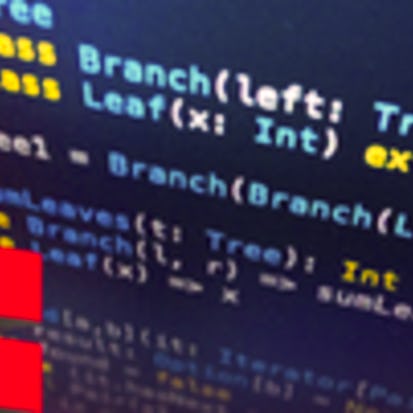- Level Professional
- Duration 56 hours
- Course by École Polytechnique Fédérale de Lausanne
-
Offered by

About
Functional programming is becoming increasingly widespread in industry. This trend is driven by the adoption of Scala as the main programming language for many applications. Scala fuses functional and object-oriented programming in a practical package. It interoperates seamlessly with both Java and Javascript. Scala is the implementation language of many important frameworks, including Apache Spark, Kafka, and Akka. It provides the core infrastructure for sites such as Twitter, Netflix, Zalando, and also Coursera. In this course, you will discover the elements of the functional programming style and learn how to apply them usefully in your daily programming tasks, such as modeling business domains or implementing business logic. You will also develop a solid foundation for reasoning about functional programs, by touching upon proofs of invariants and the tracing of execution symbolically. The course is hands-on; most units introduce short programs that serve as illustrations of important concepts and invite you to play with them, modifying and improving them. The course is complemented by a series of programming projects as homework assignments. Recommended background: You should have at least one year of programming experience. Proficiency with Java or C# is ideal, but experience with other languages such as C/C++, Python, Javascript, or Ruby is also sufficient. You should have some background in mathematics (e.g., algebra, logic, proof by induction). Last, you should have some familiarity with using the command line.Modules
Getting Started
- Example
1
Videos
- Course Introduction
7
Readings
- Working on Assignments
- Tools Setup (Please read)
- Scala 3 REPL and Worksheets
- Cheat Sheet
- SBT tutorial and Submission of Assignments (Please read)
- Learning Resources
- Scala Style Guide
Functions & Evaluation
- Recursion
- Recursion
7
Assignment
- Programming Paradigms
- Elements of Programming
- Evaluation Strategies and Termination
- Square roots with Newton's method
- Blocks and Lexical Scope
- Tail recursion
- Learning check-in
7
Videos
- Lecture 1.1 - Programming Paradigms
- Lecture 1.2 - Elements of Programming
- Lecture 1.3 - Evaluation Strategies and Termination
- Lecture 1.4 - Conditionals and Value Definitions
- Lecture 1.5 - Example: square roots with Newton's method
- Lecture 1.6 - Blocks and Lexical Scope
- Lecture 1.7 - Tail recursion
Higher Order Functions
- Functional Sets
- Functional Sets
5
Assignment
- Higher-order functions
- Currying
- Functions and data
- More Fun With Rationals
- Evaluations and Operators
8
Videos
- Week 2: Introduction
- Lecture 2.1 - Higher-order functions
- Lecture 2.2 - Currying
- Lecture 2.3 - Example: Finding Fixed Points
- Lecture 2.4 - Scala Syntax Summary
- Lecture 2.5 - Functions and Data
- Lecture 2.6 - More Fun With Rationals
- 2.7 - Evaluations and Operators
Data and Abstraction
- Object-Oriented Sets
- Object-Oriented Sets
4
Assignment
- Class hierarchies
- How classes are organized
- Polymorphism
- Scala is functional and objected-oriented
6
Videos
- Week 3: Introduction
- Lecture 3.1 - Class hierarchies
- Lecture 3.2 - How classes are organized
- Lecture 3.3 - Polymorphism
- Lecture 3.4-Objects Everywhere
- Lecture 3.5-Functions as Objects
Types and Pattern Matching
- Huffman Coding
- Huffman Coding
6
Assignment
- Decomposition
- Pattern Matching
- Lists
- Enums
- Subtyping and Generics
- Variance
7
Videos
- Week 4: Introduction
- Lecture 4.1 - Decomposition
- Lecture 4.2 - Pattern Matching
- Lecture 4.3 - Lists
- Lecture 4.4 - Enums
- Lecture 4.5 - Subtyping and Generics
- Lecture 4.6 - Variance
Lists
5
Assignment
- A Closer Look at Lists
- Tuples and Generic Methods
- Higher-order list functions
- Reduction of Lists
- Reasoning about lists
6
Videos
- Week 5: Introduction
- Lecture 5.1 - A Closer Look at Lists
- Lecture 5.2 - Tuples and Generic Methods
- Lecture 5.3 - Higher-order list functions
- Lecture 5.4 - Reduction of Lists
- Lecture 5.5 - Reasoning about lists
Collections
- Anagrams
- Anagrams
4
Assignment
- Other Collections
- Combinatorial Search and For-Expressions
- Combinatorial Search Example
- Maps
7
Videos
- Week 6: Introduction
- Lecture 6.1 - Other Collections
- Lecture 6.2 - Combinatorial Search and For-Expressions
- Lecture 6.3 - Combinatorial Search Example
- Lecture 6.4 - Maps
- Lecture 6.5 - Putting the Pieces Together
- Conclusion
Auto Summary
"Functional Programming Principles in Scala" is an in-depth course designed for IT and computer science professionals. Taught by Coursera, it delves into the fundamentals of functional programming using Scala, a language integral to frameworks like Apache Spark and Kafka. Over a substantial 3360-minute duration, learners will engage with hands-on projects to model business domains and implement logic. Ideal for those with a year of programming experience, especially in Java or C#. Subscription options include Starter, Professional, and Paid, making it accessible to a wide range of learners seeking to enhance their programming prowess.

Martin Odersky


